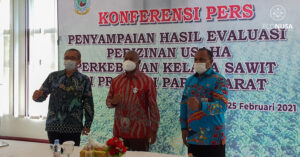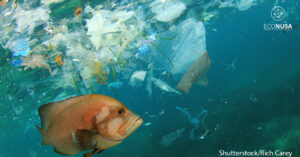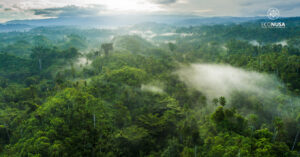
The EcoNusa Foundation and a researcher from the University of Papua (UNIPA) as well as a staff of the Kaimana Regency Bappeda who are members of the Arguni Bay Rapid Survey Comprehensive (RSC) team visited Pigo Village, Arguni Atas Bay District, Kaimana, West Papua in early October 2020. Visiting Pigo Village from the Port Tanggaromi is not an easy matter. It takes 4 hours to travel by water and 2 hours to travel overland. Geographically, the location of Kampung Pigo is closer to Teluk Bintuni Regency. In fact, according to one of the Pigo Auxiliary Puskesmas (Pustu) officers who did not want to be named, the villagers often conduct economic transactions in Teluk Bintuni Regency.
The RSC team anchored on the riverbank before continuing the road trip to Kampung Pigo. A barge was seen, some of which were filled with wooden logs. This small pier is a log pond operated by a company holding Forest Concession Rights (HPH), namely PT. Wukirasari and PT. Teluk Bintuni Mina Agro Karya. While waiting for the double axle vehicle to take the RSC team to Kampung Pigo, the group heard the sound of chainsaws roaring incessantly from across the river.
The road trip to Kampung Pigo takes a dirt road with an up and down terrain that cuts through the forest. In some parts of the road looks more bald. “This dirt road is a road made by the company. Previously, this road did not exist, so this area could not be passed by vehicles because it was a forest, ”said the Bappeda staff Abidin aziz fenetiruma, member of the RSC team.
Compared to other villages on the coast of Arguni Bay, Kampung Pigo looks different. The distance from each house in Pigo Village tends to be further apart. The activities of the residents were not seen much. There are even some houses that have been abandoned by their owners. Only a dozen houses are still occupied by their owners.
According to information from Pustu Pigo officers, if there is a dispute between residents or dissatisfaction with the village government, usually one of the parties in the dispute will leave his house. They will build a new house outside the village which is not too far away. The village where the Pustu Pigo is located is a new village. Meanwhile, the old village is far above the hills.
The social characteristics of the community make Pigo Village unique. If you hear the story from the Pustu officer, there are 3 settlements in Kampung Pigo. Currently, there are three settlements, namely the old village, the new village, and the newest village. Before the RSC team arrived in Kampung Pigo Baru, there were less than 10 houses in the residential area. According to information from the Pustu official, these were residents who were at odds with and dissatisfied with the village government of Pigo. In the old village, there are also settlements, although a little.
“The people in this village work daily to grow vegetables and hunt. Vegetable crops are sold to the company and game products are sometimes sold to Bintuni Bay because it is closer. For their daily needs, residents rely on compensation in the form of foodstuffs from “renting out” their customary land to companies holding concessions, “said the Pustu Pigo officer.
At that time, the RSC team happened to run into a resident who was carrying a cardboard filled with food ingredients from below. By relying on compensation from companies holding concessions, the daily needs of the population can be fulfilled. As a result, the economic activity of the population tends to decline.
“Even though the residents of Pigo Village are seen living side by side with companies holding HPH concessions, sometimes conflicts between residents and companies still occur. Especially when there are requests from residents that are not fulfilled by the company. The conflict resulted in the roadblocking of the company, ”said the Pustu Pigo officer.
According to a UNIPA researcher, in Tanah Papua there is a culture of land management collectively or collectively based on clans. This can indeed be a source of conflict between clans if land sales activities occur. Sometimes the distribution of proceeds from sales is not evenly distributed among all clan members. This occurs when one clan gets a higher sales result than the other clan.
Editor: Leo Wahyudi







